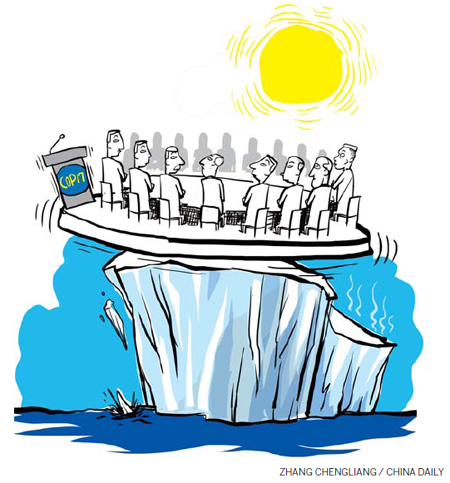Durban offers way out of zero-sum game
Updated: 2011-11-25 08:54
By Yu Hongyuan (China Daily)
|
|||||||||

The world is about to face challenges that test political willingness to fight global warming and that leaves little room to save the Kyoto Protocol. Those challenges will surface at the 17th Conference of Parties to the United Nations Framework Convention on Climate Change that begins in Durban, South Africa, on Nov 28.
As is well known, the Kyoto Protocol is the only legally binding protocol to the UN Framework Convention on Climate Change that contains legally binding measures to reduce carbon emissions, and its first commitment period is due to expire next year.
The Kyoto Protocol and its second implementation period lie at the core of protecting the "common but differentiated responsibility" principle that is the foundation for poor and rich countries' cooperation in tackling climate change.
UN Secretary-General, Ban Ki-moon, has said: "In Durban I expect governments to find a way forward for the Kyoto Protocol so we can make a broader comprehensive climate agreement possible."
However, with this year's backdrop of continuing economic woes in the US, the earthquake in Japan and the ensuing Fukushima nuclear accident, and the European Union debt crisis, political willingness to reach an ambitious deal seems to be on the wane, and many opinion leaders are on a path of lowering expectations and preparing for the worst after the Kyoto Protocol.
The protocol's future is unclear and the deadlock in negotiations for a second commitment period will only increase as the first commitment period expires. The Kyoto Protocol does not put the onus on developing countries over emissions reduction, which has laid a broad basis for UN climate change negotiations. But it has created many obstacles to be overcome before the Durban conference and Rio plus 20 next June.
The great heterogeneity within the developed world (EU and US attitudes toward Kyoto) has led to very different responses to climate change. The inherent differences over Kyoto Protocol between the umbrella group, represented by the US on one hand and the EU on the other, are still unresolved.
At the same time, by dint of strongly differing natural conditions and economic resources, there have been highly diverging policies on climate change in recent years, especially concerning emissions reduction targets and responsibilities, between new emerging developing countries and least developing countries.
In negotiations at the Durban conference the core concerns of many countries will be extending the Kyoto Protocol or drawing up a roadmap that takes us beyond 2020 in limiting carbon emissions. However, preventing catastrophic climate change is a challenge of human wisdom, and the zero-sum game needs to be transformed into everybody-wins co-operation. At present the US stance is that its policy depends on what the new emerging economies do.
The EU will support the Kyoto second implementation term, but predicated on what other developed countries commit to do. Canada, Japan and Russia have refused to extend Kyoto unless all major economies, including new emerging economies, decide to adhere to the legally binding roadmap. So keeping the Kyoto Protocol alive and preparing the global roadmap beyond 2020 stand as a Rosetta Stone to all participants.
From the start, in order to find the Rosetta Stone of climate change, there needs to be a joint recognition by all countries of the common product concept of global warming. Common product means "Joint supply and the impossibility of excluding others from consuming that product once it has been supplied to some members of the community".
Global warming is the largest common product created by developed and developing countries together.
Because the climate is a global common product, the whole world, including developing countries, must participate if the climate change crisis is to be successfully tackled.
While rich countries enjoy a relatively plentiful, wasteful and competitive use of energy, most developing countries struggle for the very basic needs of industrialization, urbanization and life's physical necessities.
Developing countries consider it an inalienable right to advance their economies and enjoy the same standard of living as people in developed countries. Of the world's 7 billion people, one third enjoy electricity. And almost 2 billion people lack access to modern energy services and live on less than $2 a day.
So developed countries bear the primary obligation to do something and cannot shirk that responsibility. However, that does not excuse developing countries from their responsibility relating to climate change in achieving their own development.
Developing and developed countries need to be treated commensurate with the way they handle their economic development. That particularly applies to the BASIC countries (Brazil, South Africa, India and China) putting concrete proposals for mitigation on the table in Durban, taking a constructive approach to climate and energy issues in bilateral and multilateral venues, and taking unilateral action to reduce greenhouse gas emissions at home.
Two examples are India's inclusive low-carbon national development plan and China's ambitious 12th Five-Year Plan (2011-2015) on green development.
Nevertheless, the BASIC countries are bearing relatively little responsibility for the current impacts of climate change, and can also work with other developing countries to offer comprehensive proposals to reduce their emissions, including specific targets and timetables. Together with other recently announced plans, these proposals have marked a sea change in the international debate, breaking the log-jam of the previous decade in which the US and other rich countries refused to make commitments to reduce emissions.
The Bali Roadmap in 2007 has continued to be the foundation of UN climate change negotiations. That roadmap has two elements: The Kyoto Protocol track, which is supposed to result in an agreement on emissions reductions commitments by annex I parties after next year, when the first commitment period ends; the UN Framework Convention on Climate Change track, which was supposed to come out with an agreed outcome in Copenhagen on enhanced implementation of the UN framework convention.
The US, Japan and Russia would not consider a climate deal "genuinely binding" if it excludes the biggest emerging economies or if those countries' commitments were conditional upon financial support from developed countries.
The EU, which is an active promoter of the Kyoto Protocol mechanism, together with some small island states, pledged that all countries will begin negotiations on the post-2020 roadmap that impose emissions reductions targets for all countries regardless of their economic wherewithal.
China and developing countries may agree to discuss the post-2020 roadmap on condition that the "common but differentiated responsibilities" principle is respected.
The first step is to build consensus between developing countries and the EU on how to keep the Kyoto Protocol alive and prepare the post-2020 roadmap. Fortunately, progress has been achieved as the EU and the major developing countries have worked together.
The world is then bound to pay more attention to build cooperation among all countries.
Despite the many differences of opinion that exist in climate change negotiations, as countries give priority to green development and low-carbon growth, the accrued knowledge offers the hope of real solutions.
For a start, with that knowledge, all the negotiators can help to work out unequivocal commitments on global emissions associated with common but differentiated principles. Such knowledge will boost the chances of success in Durban, by giving pre-eminence to cooperation and collaboration, which could be a new benchmark in global accountability.
The author is a professor with the Shanghai Institutes for International Studies. The views in the article do not necessarily reflect those of China Daily.










